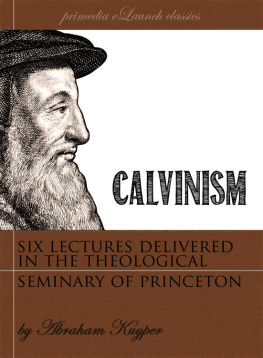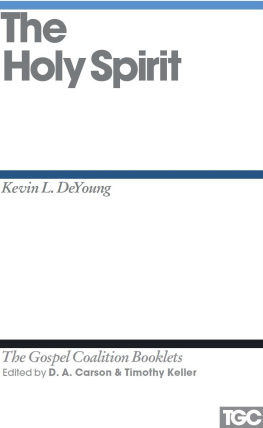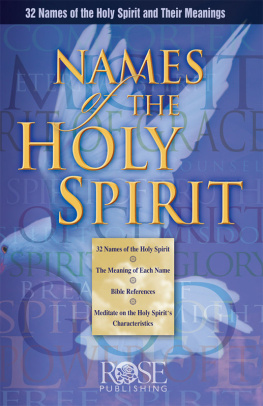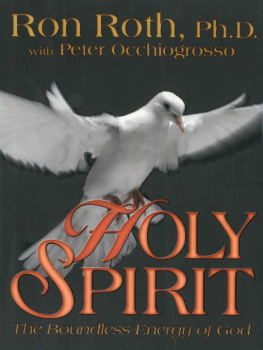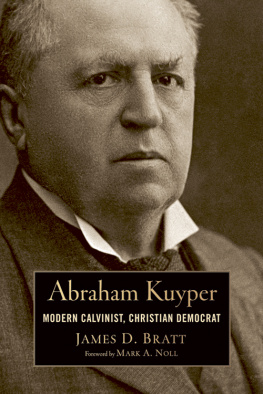Abraham Kuyper - The Work of the Holy Spirit
Here you can read online Abraham Kuyper - The Work of the Holy Spirit full text of the book (entire story) in english for free. Download pdf and epub, get meaning, cover and reviews about this ebook. year: 2010, publisher: Christian Classics Ethereal Library (www.ccel.org), genre: Religion. Description of the work, (preface) as well as reviews are available. Best literature library LitArk.com created for fans of good reading and offers a wide selection of genres:
Romance novel
Science fiction
Adventure
Detective
Science
History
Home and family
Prose
Art
Politics
Computer
Non-fiction
Religion
Business
Children
Humor
Choose a favorite category and find really read worthwhile books. Enjoy immersion in the world of imagination, feel the emotions of the characters or learn something new for yourself, make an fascinating discovery.

- Book:The Work of the Holy Spirit
- Author:
- Publisher:Christian Classics Ethereal Library (www.ccel.org)
- Genre:
- Year:2010
- Rating:3 / 5
- Favourites:Add to favourites
- Your mark:
- 60
- 1
- 2
- 3
- 4
- 5
The Work of the Holy Spirit: summary, description and annotation
We offer to read an annotation, description, summary or preface (depends on what the author of the book "The Work of the Holy Spirit" wrote himself). If you haven't found the necessary information about the book — write in the comments, we will try to find it.
The Work of the Holy Spirit — read online for free the complete book (whole text) full work
Below is the text of the book, divided by pages. System saving the place of the last page read, allows you to conveniently read the book "The Work of the Holy Spirit" online for free, without having to search again every time where you left off. Put a bookmark, and you can go to the page where you finished reading at any time.
Font size:
Interval:
Bookmark:
Printed in the United States of America.
Special treatises on the Person of the Holy Spirit are comparativelyfew, and systematic treatment of His Work is still moreuncommon. In dogmatics, it is true, this subject is introduced, developed,and explained, but special treatment is exceptional.
As much as there is written on Christ, so little is there written onthe Holy Spirit. The work of John Owen on this subject is most widelyknown and still unsurpassed. In fact, John Owen wrote three works onthe Holy Spirit; published in 1674, 1682, and 1693. He was naturally aprolific writer and theologian. Born in 1616, he died at the good oldage of seventy-five years, in 1691. From 1642, when he published hisfirst book, he continued writing books until his death.
In 1826 Richard Baynes reissued the works of John Owen, D.D.,edited by Thomas Russell, A.M., with memoirs of his life and writings(twenty-one volumes). This edition is still in the market, and offersa treasury of sound and thorough theology.
Besides Owens works I mention the following:
David Rungius, Proof of the Eternity and Eternal Godhead ofthe Holy Spirit, Wittenberg, 1599.
Seb. Nieman, On the Holy Spirit, Jena, 1655.
Joannes Ernest Gerhard, On the Person of the Holy Spirit,Jena, 1660.
Theod. Hackspann, Dissertation on the Holy Spirit,Jena, 1655.
J. G. Dorsche, On the Person of the Holy Spirit,Kningsberg, 1690.
Fr. Deutsch, On the Personality of the Holy Spirit,Leipsic, 1711.
Gottfr. Olearius (John F. Burgius), On the Adoration andWorship of the Holy Spirit, Jena, 1727.
J. F. Buddeuss, On the Godhead of the Holy Spirit,Jena, 1727.
J. C. Pfeiffer, On the Godhead of the Holy Spirit,Jena, 1740.
G. F. Gude, On the Martyrs as Witnesses for the Godhead orthe Holy Spirit, Leipsic, 1741.
J. C. Danhauer, On the Procession of the Holy Spirit from theFather and the Son, Strasburg, 1663. J. Senstius, Rostock, 1718,and J. A. Butstett, Wolfenbttel, 1749. John Schmid, John Meisner,P. Havercorn, G. Wegner, and C. M. Pfaff.
The Work of the Holy Spirit hasbeen discussed separately by the following: Anton, The HolySpirit Indispensable. Carsov, On the Holy Spiritin Conviction. Wensdorf, On the Holy Spirit as aTeacher. Boerner, The Anointing of the Holy Spirit.Neuman, The Anointing which Teaches All Things. Fries,The Office of the Holy Spirit in General. Weiss, TheHoly Spirit Bringing into Remembrance. Foertsch, On theHoly Spirits Leading of the Children of God. Hoepfner,On the Intercession of the Holy Spirit. Beltheim, Arnold,Gunther, Wendler, and Dummerick, On the Groaning of the HolySpirit. Meen, On the Adoration of the Holy Spirit.Henning and Crusius, On the Earnest of the Holy Spirit.
The following Dutch theologians have written on the same subject:Gysbrecht Voetius in his Select-Disput, I, p. 466. Sam,Maresius, Theological Treatise on the Personality and Godheadof the Holy Spirit, in his Sylloge-Disput, I,p. 364. Jac. Fruytier, The Ancient Doctrine Concerning God theHoly Spirit, True, Proven, and Divine; exposition of . Camp, Vitringa, Jr., Du DisputationesAcademic de Notione Spiritus Sancti, in his Opuscula.
Works on the same subject during the present century can scarcely becompared with the studies of John Owen. We notice the following: Herder,Vom Paraclet. Kachel, Von der Lsterung widerden Heiligen Geist, Nrnberg, 1875. E. Guers, LeSaint-Esprit, tude doctrinale et pratique sur Sa Personne et Sonuvre, Toulouse, 1865. A. J. Gordon, Dispensation ofthe Spirit.
This meager bibliography shows what scant systematic treatmentis accorded to the Person of the Holy Spirit. Studies of the Work ofthe Holy Spirit are still more scanty. It is true there are severaldissertations on separate parts of this Work, but it has never beentreated in its organic unity. Not even by Guers, who acknowledges thathis little book is not entitled to a place among dogmatics.
In fact, Owen is still unsurpassed and is therefore much soughtafter by good theologians, both lay and clerical. And yet Owensmasterpiece does not seem to make a closer study of this subjectsuperfluous. Although invincible as a champion against the Arminians andSemi-Arminians of the latter part of the seventeenth century, his armoris too light to meet the doctrinal errors of the present time. For thisreason the author has undertaken to offer the thinking Christian publican exposition of the second part of this great subject, in a form adaptedto the claims of the age and the errors of the day. He has not treatedthe first part, the Person of the Holy Spirit. This is not a subject forcontroversy. The Godhead of the Holy Spirit is indeed being confessed ordenied, but the principles of which confession or denial is the necessaryresult are so divergent that a discussion between confessor and denieris impossible. If they ever enter the arena, they should cross lanceson the point of first principles and discuss the Source of Truth. Andwhen this is settled, they might come to discuss a special subject likethat of the Holy Spirit. But until then such a discussion with them thatdeny the Revelation would almost be sacrilegious.
But with the Work of the Holy Spirit, it is different. Foralthough professing Christians acknowledge this Work, and all that itincludes, and all that flows from it, yet the various groups into whichthey divide represent it in very divergent ways. What differences onthis point between Calvinists and Ethicals, Reformed, Kohlbruggians, andPerfectionists! The representations of the practical Supernaturalists,Mystics, and Antinomians can scarcely be recognized.
It seemed to me impracticable and confusing to attack these deviatingopinions on subordinate points. These differences should never bediscussed but systematically. He that has not first staked off the entiredomain in which the Holy Spirit works can not successfully measure anypart of it, to the winning of a brother or to the glory of God.
Hence leaving out polemics almost entirely, I have made an effort torepresent the Work of the Holy Spirit in its organic relations, so thatthe reader may be enabled to survey the entire domain. And in surveying,who is not surprised at the ever-increasing dimensions of the Work ofthe Holy Spirit in all the things that pertain to God and man?
Even tho we honor the Father and believe on the Son, how littledo we live in the Holy Spirit! It even seems to us sometimes that for our sanctification only, the Holy Spirit is added accidentallyto the great redemptive work.
This is the reason why our thoughts are so little occupied with theHoly Spirit; why in the ministry of the Word He is so little honored;why the people of God, when bowed in supplication before the Throneof Grace, make Him so little the object of their adoration. You feelinvoluntarily that of our piety, which is already small enough, Hereceives a too scanty portion.
Font size:
Interval:
Bookmark:
Similar books «The Work of the Holy Spirit»
Look at similar books to The Work of the Holy Spirit. We have selected literature similar in name and meaning in the hope of providing readers with more options to find new, interesting, not yet read works.
Discussion, reviews of the book The Work of the Holy Spirit and just readers' own opinions. Leave your comments, write what you think about the work, its meaning or the main characters. Specify what exactly you liked and what you didn't like, and why you think so.

